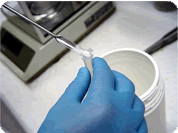Frequently Asked Questions
Production technique
- What synthetic methods are used?
- How are my peptides synthesised?
- What length peptides do you synthesise?
- What peptide modifications do you perform?
- Do you outsource any synthesis?
Your order
- What data is supplied?
- What will it cost?
- How do I order?
- What purity should I order?
- Is my order confidential?
- How long will my order take?
- What if there are problems with my order?
Peptide storage and use
Production technique
What synthetic methods are used?
Fmoc and Boc methodologies are both employed, using solid and solution phase reactions. Fmoc chemistry is most suitable for simple peptides and sequences prone to oxidation, but the use of Boc chemistry allows us to synthesise difficult sequences, and gives a greater flexibility in the synthesis of modified peptides. Most peptide synthesis is carried out in the solid phase, but certain modifications are carried out in solution after peptide synthesis and cleavage from the resin.
How are my peptides synthesised?
Peptides are synthesised either on an automated peptide synthesiser or by manual synthesis. Automated synthesis is used for rapid production of simple peptides, whereas manual synthesis is ideal for long or difficult sequences, and peptide modifications.
What data is supplied?
All peptides are supplied with RP-HPLC and electrospray mass spec data. CHN analysis, amino acid analysis and N-terminal sequencing can be supplied at an extra cost. View example data.
What peptide modifications do you perform?
We can perform a very wide range of peptide modifications. Take a look at some examples of recent peptide modifications ordered at PPR Ltd. Our custom peptide synthesis page has further details on peptide modifications.
Do you outsource any synthesis?
No! We synthesize all of our peptides here in our laboratory in Hampshire, United Kingdom.
Your order
What length peptides do you synthesise?
Peptides up to 60 amino acids are routinely synthesised. Longer peptides can be synthesised, depending on the suitability of the sequence. Long peptides can sometimes be synthesised in fragments and the fragments joined together by native chemical ligation, which forms a natural peptide bond at the ligation site.
What will it cost?
All peptide prices are quoted on an individual basis, and will depend on peptide sequence, purity, amount and any modifications required. Please contact us for a quotation.
How do I order?
To receive a quotation please e-mail us your sequence, the amount required and purity and we will send you a quotation. Once you have received this, we accept orders by e-mail or fax. Please state your quotation reference on the order. Enquiries can be made by telephone, e-mail or fax. Please also view our Terms and Conditions of order.
What purity should I order?
The most common purity requested is >95%, as determined by RP-HPLC. This purity is suitable for most applications. For antibody production >85% purity is often sufficient, and for structural studies, e.g. NMR and Crystallography >98% is recommended. Crude peptides (>50%) can be used for screening large numbers of peptides. We are happy to quote for whatever purity level you require.
Is my order confidential?
Yes, every peptide sequence is kept confidential, and we are happy to sign a confidentiality agreement if you desire.
How long will my order take?
We aim to supply peptides within 3-5 weeks of receipt of your order. Shorter peptides may be dispatched sooner, difficult peptides sequences or unusual modifications may take longer, and this will be indicated in your quotation if possible. Modifications that require us to purchase compounds from another company may affect delivery time, as these compounds will not be purchased until receipt of your order. See the delivery page for more info.
What if there are problems with my order?
Each peptide sequence is unique and some peptides sequences prove problematic during synthesis. If problems do occur with your order we will inform you as soon as possible. Sometimes peptides have to be resynthesised to provide the required yield, meaning orders will take longer to complete. In these instances part of your order will be shipped as soon as it is ready, and the remaining amount will be supplied as soon as possible.
Peptide storage and use
How should I store my peptide?
For the most effective long term storage of peptides it is advised to store as a lyophilised powder at -20 C. Repeated freeze-thaw should be avoided, so if only small quantities are required at a time then aliquot before freezing. We can aliquot your peptide into smaller quantities for you on request, e.g. 10mg split into 1mg aliquots. Exposure to moisture will greatly decrease long-term stability of lyophilised peptides. To prepare the peptide for use, remove from cold storage and allow the peptide to equilibrate to room temperature before removing the lid of the container.
How should I solubilise my peptide?
Refer to the datasheet provided with your peptide for solubility information and refer to Solubilisation Guide at top of page. Alternatively, first try to dissolve a small amount of the peptide in either water or buffer. If the peptide does not dissolve try using an organic solvent such as DMSO to solubilise the peptide, then dilute using water or buffer. Peptides containing cysteine are easily oxidised, so solutions should be prepared just prior to use. If your peptide requires special treatment you will be informed when the peptide is sent to you.
End of page. Back to content or main menu.


